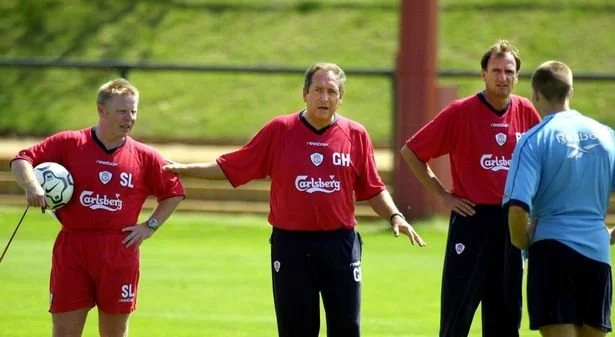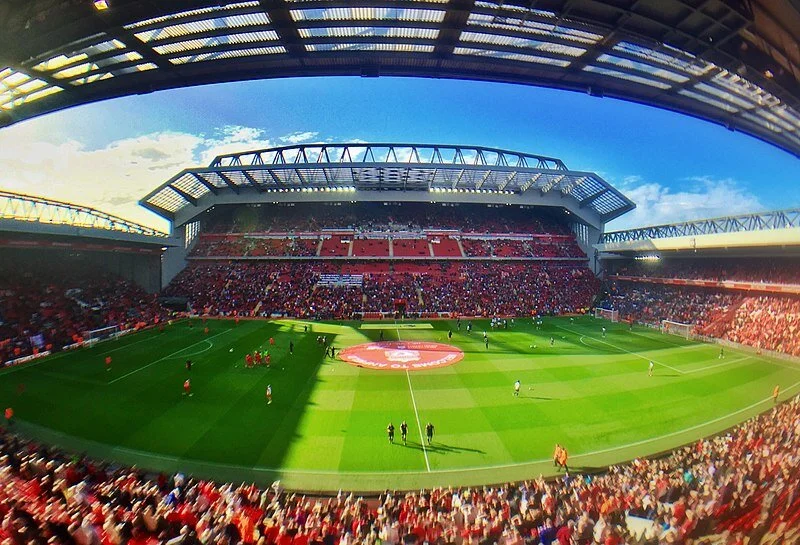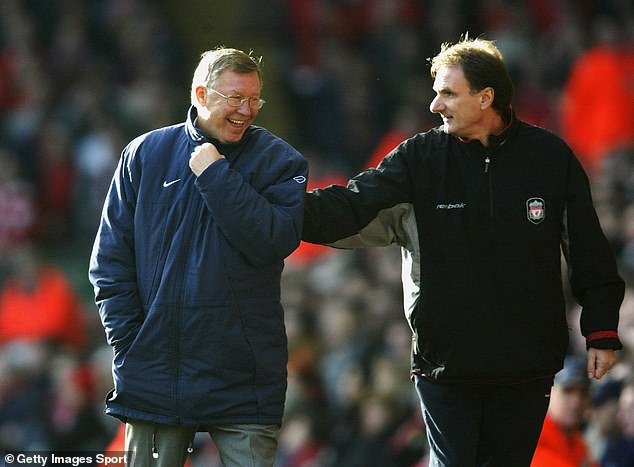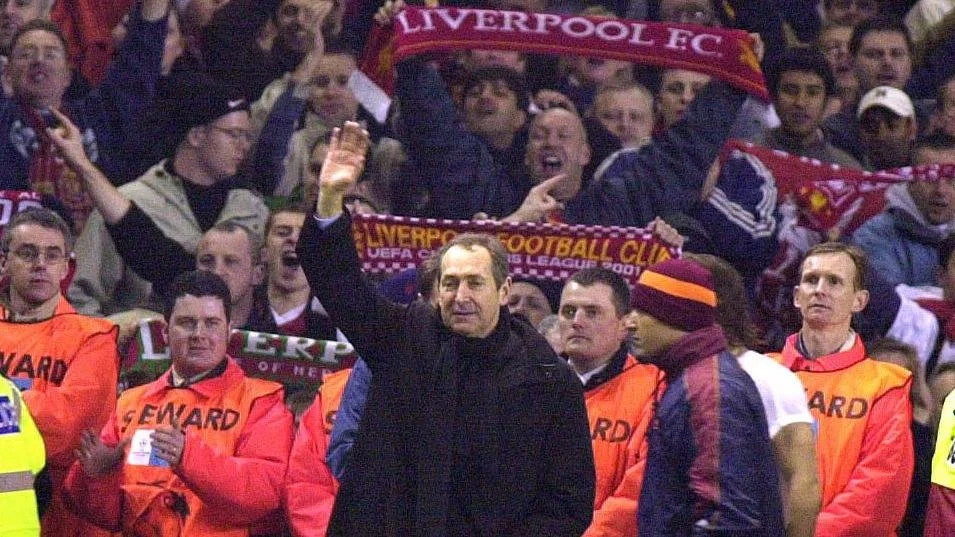When Phil Thompson managed Liverpool
On 27th August 2020 Phil Thompson was let go by Sky Sports after 22 years. A decision had been made that Sky were ‘changing some parts of our football coverage’. The implication was that Sky Sports were moving with the times and Thompson alongside fellow pundits, Matt Le Tissier and Charlie Nicholas represented the past.
Thompson had become synonymous with his pro Liverpool bias and passionate rants. He was viewed as a relic of a time when English football was built on these foundations. Thompson is however a far more complex, open minded and thoughtful figure than popular perception may suggest. As assistant to Gerrard Houllier Thompson helped begin Liverpool’s shift into the modern era. In 2001 when Houllier suffered a heart attack Thompson stepped in as manager for six months. In doing so he contributed heavily to what was Liverpool’s strongest title challenge in an 18 year period.
Thompson is as he describes himself ‘first as foremost Liverpudlian and proud of it’. He was born in Kirkby in 1954. His first visit to Anfield was for the 1965 European cup semi final against Helanio Herrara’s Inter Milan of catenaccio fame. Thompson fondly remembers the ‘deafening…roar from the Kop.’ He was first spotted by Liverpool at aged 14 and continued to stand on the Kop until he was 17, by which time he had turned professional and began getting noticed by fans. Thompson went on to make 477 appearances for the reds, winning 7 league titles, 3 European cups and captaining the club from 1979-1981. As he puts it, it ‘was like winning the lottery everyday’.
After retiring aged 31 in 1986, Kenny Dalglish offered him a role in the club as reserve team manager which saw him enter the fabled boot room. Prior to this Thompson had been managing a Sunday League team in Liverpool. Thompson talks at his pride at being able to write in ‘the famous training ground books that were updated meticulously every day.’ Thompson earned a reputation for his passion and it was jokingly suggested by stewards that they should sell tickets for fans to sit out the changing rooms after games and hear his ‘ranting and raving’. For Thompson, ‘every game, was in my book like a European cup final.’
In 1992 when his former teammate Graeme Souness was manager Thompson was sacked from his role. The reason for this remains unclear. Thompson was told ‘you have been rollicking the young lads in the reserve team too much’. Thompson however feels there were more personal reasons, there were rumours that Thompson had been after Souness’s job, and he was later told that his departure came about from comments Thompson had made to Manchester United assistant Brian Kidd about ‘Graeme changing things too fast.’ Thompson was ‘distraught’ and felt he had been betrayed, remarking to David James, who had just joined the club, ‘keep your back to the wall. Make sure there is no one with a knife to stab you.’ Thompson recounts how his children had cried when they heard the news. After leaving Liverpool Thompson concentrated on the DIY shop he owned in the city and did some work for SKY TV. When Roy Evans was appointed and failed to invite Thompson back into the fold it seemed like his chance was over and he had to ‘get on with my life’
Thompson’s rehabilitation was not to come from that boot room legacy but in the ‘rebirth’ led by Gerrard Houllier in 1998. As Jamie Carragher states ‘The Anfield environment had to change.’ Steven Gerrard however recalls ‘I was just terrified of this French set up. I wanted it to be English.’ As such Houllier had been advised ‘you need someone who is English and understands the history of the club’...someone with pedigree who could stand up to the players.’ Carragher explains ‘Thompson…ensur[ed] the spirit of the Shankley boys could be passed down to a new generation of players.’ Thompson was ‘back on the rollercoaster’, stating you ‘feel that red heart pounding inside your chest and you will know that nothing can stop you answering the call from Liverpool football club’. Michael Owen describes Thompson ‘there were few people…who loved Liverpool more…He stood in total contrast to Houllier, who was usually calm and collected.’ Thompson initially saw his role as someone who ‘could help Houllier with discipline’…’to tighten things up…that might make me Mr Nasty to some, but I didn’t want to shirk the responsibility.’ As Carragher puts it ‘his return wasn’t welcomed in some parts of the dressing room…[who] reacted as if they’d suffered a family bereavement.’ Emile Heskey states ‘Gerard…had Phil Thompson to do all the shouting for him…Phil was definitely the bad cop of the partnership.’ However, as Thompson notes Houllier ‘must have thought I can help progress this lad as a coach. This is what he did.’ Thompson feels ‘people had this perception of me as this ranting and raving lunatic…they do not give me credit for the fact that…my whole career has been about understanding the game.’ Thompson evidently has great admiration for Houllier as a coach and as a man, describing him as ‘a highly intelligent and likeable workaholic’ as well as a ‘football guru.’ Thompson embraced the new ‘completely structured’ training regimes, describing them as ‘fantastic because they were so varied.’ Far from the dinosaur of public perception Thompson was able to recognise the need to move away from the training regimes of traditional Liverpool five aside’s telling players ‘this team needs to be more organised’. Thompson notes ‘back in the old days the routine never varied’ but now ‘there were different sessions everyday…younger minds need stimulating more.’ Steven Gerrard explains that ‘The perception of Tommo as not the cleverest is wrong. He knows his football.’
Thompson was however aghast at the lack of discipline at the club when he arrived. This was a key feature of his early days at the club ‘we made it absolutely clear to the players that things would have to change’ and change they did. Gerrard states ‘some players found it hard because Liverpool had been more relaxed under Roy Evans. Some couldn’t adapt.’ Thompson retained his aggression side, notably kicking a hole in the advertising hoardings during a loss to Derby. Robbie Fowler states ‘Tommo wasn’t exactly laid back at the best of times, so given a mandate to get tough he was fucking impossible.’ Steven Gerrard was more open, ‘Tommo is a fiery character…we’ve had our little run ins…we’ve always been man enough to patch things up afterwards. We both want what is best for Liverpool’. Disruptive influences not susceptible to the new regime such as then club captain Paul Ince who is reported to have remarked, ‘I don’t do running, don’t you know who I am?’ were however shown the door. Thompson was using his passion not to instil old fashioned ideals but as an enforcer of modern values, diplomatically stating regarding Ince ‘if you asked if I had difficult times with him. I would say yes.’ As Carragher states ‘some of the older professionals were beyond help.’ Steven Gerrard talks of hearing as a young player that ‘the French changed everything and that no one enjoyed training anymore. Gerard was really strict.’ Fowler while injured recalls being told ‘there was no enjoyment allowed in training.’ As it happens when Gerrard did join in training ‘for all my fears…I loved it…the pattern of play work was enjoyable. The practice games were brilliant.’ Carragher recalls veteran Gary McAllister being ‘amazed by this meticulous preparation.’ Liverpool became a well drilled and effective team, culminating in the third-place finish and treble winning season of 2000/01.
By 01/02 ‘expectations [were] soaring that we could now win our first Championship in 12 years.’ By the 7th match of the season on October 13th against top of the table Leeds, Liverpool had won 4 and lost 2 of their 6 games and were sitting in 6th place. This day would for Thompson ‘remain etched into my mind forever’. At half time Houllier began experiencing problems with his chest, by the time Thompson sent the team out for the second half he had seen his mentor in an oxygen mask. It dawned on Thompson that despite the fact ‘the only thing on my mind was Gerard’s health…I was now in charge. I would have to make the substitutions and tactical decision.’ Thompson faced the press conference where he ‘used all of the experience I had gained and kept myself composed. I needed to keep myself together for Gerard, the players and the club.’ He then rushed to hospital to be by his managers side. It transpired that Houllier had an aortic dissection and was rushed to hospital for an operation described as a ’70-30’ chance of success. As Houllier went into the operating theatre Thompson held his hand and told him ‘you are going to be alright, you are in good hands,’ before promising ‘I will take care of everything. You can rely on the staff and me.’
The next day Liverpool were due to fly to Kiev for a champions league tie. By the time of take-off, no news had reached the club regarding the success of operation. Thompson and Houllier always sat together and he recalls he ‘kept looking at the empty seat…and hoping and praying he was alright.’ The two men usually shared two bags of wine gums between them on flights, Thompson ‘put the wine gums in their usual place and was sitting there chewing them with my mind in turmoil. I was thinking: You should be with us.’ On landing the team discovered Houllier had come through the operation. Thompson recalls his nerves on giving the team talk, ‘Gerard was top notch with his team talks. He had two separate flip charts with diagrams and headings.’ Thompson prepared the flip charts as he believed Houllier would have but with one addition. On the last page Thompson had written in capital letters ‘LET’S DO IT FOR THE BOSS’. Liverpool achieved a credible 2-1 victory; Steven Gerrard describes how he ‘poured all of his concern for our missing manager into that tie.’ Aware of Houllier’s emotional fascination with European competition Thompson made himself and the players vow that when the Houllier returned, ‘I wanted us to still be in the Champions League.’ That vow was to prove especially pertinent.
Thompson was aware he would need to dial down the passion ‘to enable me to make crucial decisions about tactics and the like’ so encouraged Sammy Lee to take over his mantle in this regard. Heskey notes that ‘When Phil became manager…he had to change his methods. He mellowed a little and took on a lot of Gerard’s traits…he was encouraging and showed a more fatherly side.’ Wondering ‘perhaps that showed he was playing a role as Gerard’s assistant, offering that balance to his own character?’ With Houllier not due to return for some time speculation was widespread about Thompson’s ability to take on the role. Thompson himself was sure ‘I had learned enough to put Gerard’s practices into action on the training ground’ and assured the board that they ‘could rely on me 100 per cent’. Thompson was quickly given the job as manager on a temporary basis until Houllier returned. After the Kiev game Liverpool headed to Filbert Street to face Leicester, where a Robbie Fowler hattrick ensured a 4-1 victory. Thompson persevered with Houllier’s flip charts and continued finishing off with a ‘little comment about Gerard’. This persisted as a feature of Thompson’s team talks throughout his time in charge. ‘I tried to make it different each time, but the fundamental message remained the same’. Michael Owen credits this with helping the team cope ‘we always knew the manager was watching and told ourselves not to let him down.’ Liverpool continued to flourish and followed this up with another victory in the league away to Charlton, a draw in the Champions League at Boavista, a key win at an Anfield against Borussia Dortmund to take control of the group and best off all a 3-1 home victory against Manchester United. Houllier and Thompson had felt they had identified a tactic to effectively neuter the champions by playing ‘four at the back, a protector just in front, three tight in midfield and two up front…we allowed United to go wide up to the half way line then we would shuffle back.’ By this time Houllier was able to watch matches on television and listen on the radio and reassured Thompson that, ‘I knew what changes you would make. It was exactly what I would have done.’ Carragher concurs describing the changeover as ‘’faultless.’ The following game Liverpool drew away at Souness’s Blackburn. After being substituted Michael Owen was seen on television shaking his head. On facing Owen after the game Thompson describes how, ‘this type of conversation was something Gerard would always do. I would be Mr Angry. We had this good cop, bad cop thing, but now I was in a role in which I had to think about the welfare of the players, always thinking one step ahead.’ Thompson had to adjust his approach and speak to Owen in a calmer manner, conceding Owen was ‘right to show disappointment…but it can sometimes show a lack of respect for the person coming on.’
After the Blackburn game Liverpool welcomed Barcelona to Anfield in the first match of a fiendishly difficult Champions League group featuring Barcelona, Italian champions Roma and Galatasaray. Barcelona ended up giving Liverpool ‘a real footballing lesson in a punishing 3-1 defeat’ following ‘the best display of keep ball’ Thompson has ‘ever seen from a team.’ As the season moved into December Houllier was able to return home from hospital with Liverpool top of the table.
On 30th November Robbie Fowler was sold to Leeds, he was not playing regularly with ‘Owen and Heskey already forming a good partnership and with Jari Litmanen in contention’. Despite some tension Thompson is adamant this was a selection issue and Houllier was ‘involved in the discussions about our stance. It certainly wasn’t just down to me.’ Fowler himself states Houllier had for a long time ‘made it fucking obvious he wanted to see the back of me.’ Liverpool’s good form continued into December with a vital 0-0 draw away to Roma and a run of 5 clean sheets in a row maintaining their position at the top of the table. Going into the match at Chelsea on the 16th December Thompson had just one defeat in 14 games as manager. However, a 4-0 defeat to Chelsea match started a drop in form that arguably cost Liverpool that elusive league title. Liverpool followed this up with a home loss to eventual champions Arsenal and embarked on a run of one win in nine games, that as Owen puts it ‘derailed us at the wrong time’ and saw them slump to 4th place.
During this period Houllier had suggested Nicholas Anelka as a replacement for Robbie Fowler and the Frenchman was signed on a loan deal until the end of the season. The run of bad results was finally ceased following an intervention from Sammy Lee. With Thompson facing mounting criticism from the press, Lee stood up in front of the players and exclaimed ‘You lot need to get your fingers out. This fella has taken all the flak and never criticised any of you in public.’ It turns out what the new Phil Thompson needed to get him out of a rut was some help from the old Phil Thompson. Following Lee’s speech Liverpool travelled to Old Trafford on 22nd January. Using the ‘tried and tested 4-1-3-2 formation…against all predictions we had a fantastic day.’ To Thompson’s delight it was Danny Murphy, booed by his own fans the previous game, who scored the winner. Thompson states he named Murphy in the line-up as a ‘psychological thing on my part…he would have to rise above it. The other players knew Danny’s qualities and appreciated the vote of confidence.’. Carragher states ‘Danny grabbed the winner, so their pep talks worked.’
On 27th January Liverpool were knocked out of the FA cup by Arsenal. This was to be the last defeat of Thompson’s reign as manager. Worst still the club were embroiled in controversy when Jamie Carragher, having been hit by a coin thrown by a supporter hurled it back into the crowd. Thompson expressed ‘this was a learning curve for me’ but knew ‘we must stifle this now’ by making Carragher issue an immediate apology. Thompson feels ‘his words helped stem the criticism and I felt we had acted in a professional manner in dealing with the situation.’ Carragher himself is effusive in his praise of Thompson’s handling of this and other incidents ‘issues that that might have been difficult for other coaches were no hassle to him…he wouldn’t think twice about slaughtering anyone who deserved it in private, but publicly he wouldn’t have a bad word to say about us.’
Liverpool kept up the good results in the league to remain in contention, including back to back 4-0 and 6-0 victories against Leeds and Ipswich at the beginning of February before the Champions league resumed on the 20th February. Home and away draws with Galatasary were followed by a further draw at the Nou Camp, whereby Thompson hit back at Barcelona players criticising Liverpool’s style of play by stating ‘it was a shame their Dutch players could not just concentrate on their own international futures. If they had thought more about those games rather than having a go at us they would be going to the world cup…instead of…meeting Mickey Mouse.’ By now Thompson explains Houllier ‘was having an input with bits in training and team selection. On the day it was still down to me.’ After a further three victories in a row Liverpool moved within two points of league leader Manchester United before facing the crucial final Champions league group game against Roma.
What transpired next is described by Thompson as ‘possibly the most emotional night I have ever been involved in at Anfield.’ Houllier and Thompson had discussed ‘that if he felt we needed something in the last game of our Champions league group then he would consider making a comeback.’ With Liverpool requiring a victory to qualify a plan was devised for Houllier to make a surprise return. ‘Only two people knew about Gerard’s plans…him and me.’ Thompson states ‘I knew Gerard’s presence against Roma would have the desired effect. At that moment in time I would have put my house on us…getting the right result.’ The players entered the dressing room for the pre match team talk to find Houllier waiting for them. As Steven Gerrard recalls ‘we were all overjoyed…everyone was flying to know the boss was back watching us.’ Thompson recalls a touching moment as Houllier waited to enter the pitch and asked him ‘Do I look okay?’ ‘Fantastic’ was the reply. When Houllier’s emerged from the tunnel the atmosphere was ‘electric.’ As Thompson puts it ‘Anfield exploded and the Kop raised their banners higher than ever, I’m sure the Italian boss knew they could never win this game.’ Liverpool prevailed 2-0 to qualify for the quarter finals of the European cup for the first time in 17 years. Thompson had kept his promise to keep Liverpool in Europe until Houllier returned. Five days later Liverpool beat Chelsea 1-0 at Anfield to go top of the league.
While Houllier stated Liverpool were now ‘ten games from greatness’ a late defeat to Bayern Leverkusen saw them crash out of the champions league. Despite winning 6 of 7 remaining games, an inspired run by Arsenal, who had a game in hand, meant Liverpool were pipped into second place.
Jamie Carragher outlines Thompson’s time as manager as ‘one of the most underrated periods of any era…Thommo especially impressive after he was thrust into the limelight…I know many of the lads preferred Thommo in his role as caretaker manager…he proved a lot of doubters wrong’. Michael Owen describes Thompson as ‘building up a terrific record during his time in charge’ while Steven Gerrard states ‘he did a good job as caretaker.’ A view shared my Emile Heskey who ‘felt he did very well in that role…he did the club proud in that period’. The stats bear this out. In 24 league games as manager Thompson achieved 14 wins, 7 draws and 3 losses. This works out as a points per game of 2.04 which over the course of a season would be 77.58 points. While Liverpool got a slightly higher number of points that season (80), it should be noted Thompson’s fixtures included both matches against 1st place Arsenal and 3rd place Manchester United. Thompson’s points extrapolated points total would have been enough to secure second place that season as well as any of the previous three. It would not be beaten in a Liverpool 38 games season until 2005/06. More than that Thompson’s openness to change and self-awareness shows an ability to adapt to the modern game lost on many of his contemporaries and that is harshly at odds with his reputation.
Ben Jones, The Left-sided Problem
-
On this day in 2001, Zinedine Zidane signed for Real Madrid. This transfer is just one reason why the 2001/02 seaso… https://t.co/bI2J6AT97K
-
Little quiz question…who were the last team (and when) to reach a European Cup/Champions League final and not play… https://t.co/4bZlA9KYHH
-
16 years since this game. Not sure there has been a tournament match like it since, two top class teams, playing at… https://t.co/gbpaqAQ8Qj






